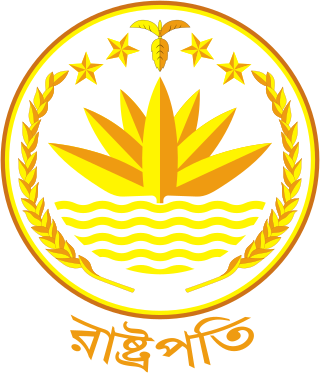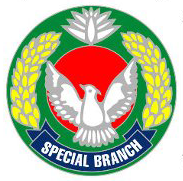
Sheikh Mujibur Rahman, popularly known by the honorific prefix Bangabandhu was a Bangladeshi politician, revolutionary, statesman, activist and diarist. As a politician, Mujib had held continuous positions as president or prime minister from April 1971 until his assassination in August 1975: as president from 1971 to 1972 and briefly from 1975 until his death, and as prime minister from 1972 to 1975. Mujib successfully led the Bangladeshi independence movement and restored the Bengali sovereignty after over two centuries following the Battle of Plassey in 1757, for which he is honoured as the 'Father of the Nation' in Bangladesh. In 2011, the fifteenth constitutional amendment in Bangladesh referred to Sheikh Mujib as the Father of the Nation who declared independence; these references were enshrined in the fifth, sixth, and seventh schedules of the constitution. His Bengali nationalist ideology, socio-political theories, and political doctrines are sometimes called Mujibism.

The President of Bangladesh officially the president of the People's Republic of Bangladesh is the head of state of Bangladesh and commander-in-chief of the Bangladesh Armed Forces.

Khondaker Mostaq Ahmad was a Bangladeshi politician. He was the fourth president of Bangladesh from 15 August to 6 November 1975, after the assassination of Sheikh Mujibur Rahman. He was involved in the assassination of Bangabandhu Sheikh Mujibur Rahman on 15 August 1975. He took on the role of president immediately after the assassination, praised the assassins as "sons of the sun" and put cabinet ministers loyal to Sheikh Mujibur Rahman in jail.
Syed Faruque Rahman was a coup member involved in toppling the Sheikh Mujib regime in Bangladesh. He was convicted and hanged on 28 January 2010 along with co-conspirators Sultan Shahriar Rashid Khan, A.K.M. Mohiuddin Ahmed, Mohiuddin Ahmed, and Mohammad Bazlul Huda in Dhaka Central Jail, Old Dhaka, for the murder of Sheikh Mujibur Rahman, the founder and first President of Bangladesh. Syed Faruque Rahman and his close ally Khondaker Abdur Rashid were the chief organisers of the assassination of Sheikh Mujibur Rahman on 15 August 1975. He was 2IC of the 1st Bengal Lancers Regiment of the Bangladesh Army who led a group of junior army officers in-order to overthrew the regime of Sheikh Mujibur Rahman and installed Khondaker Mushtaque Ahmed as President of Bangladesh.

The first president of Bangladesh, Sheikh Mujibur Rahman, and most of his family were killed during the early hours of 15 August 1975 by a group of Bangladesh Army personnel who invaded his Dhanmondi 32 residence as part of a coup d'état. Minister of Commerce, Khondaker Mostaq Ahmad, immediately took control of the government and proclaimed himself president. The assassination marked the first direct military intervention in Bangladesh's civilian administration-centric politics. 15 August is National Mourning Day, an official national holiday in Bangladesh.

The Directorate General of National Security Intelligence, commonly known as the NSI, is the principal civilian intelligence agency of the People's Republic of Bangladesh. The NSI's headquarters is in 1 Segunbagicha, Dhaka, Bangladesh. The NSI is the leading body of the Government of Bangladesh in the field of internal security, counter terrorism, counter intelligence and foreign intelligence. NSI is the largest among the intelligence agencies in Bangladesh, the others being the Directorate General of Forces Intelligence (DGFI), SB, CID, PBI and intelligence directorates of armed and paramilitary forces. The agency stands under the direct authority of the Prime Minister of Bangladesh.
The Bangladesh Intelligence Community is a group of several intelligence agencies charged with carrying out intelligence-gathering activities considered necessary for the conduct of foreign relations and national security of Bangladesh including other functions vital for the national security of Bangladesh. Member organizations of the Bangladesh intelligence community include military intelligence of Bangladesh Army, Navy, Air Force, National Police and civilian intelligence and analysis offices within executive ministries. The I.C. is headed by a Director heading each Intelligence agency, who reports to the Prime Minister of the Bangladesh.The organisation and structure of the modern Bangladesh intelligence community has developed its structures from agencies that continued to function after Independence from Pakistan. Bangladesh intelligence agencies today are the National Security Intelligence, the Special Branch, Army Intelligence, Air Force Intelligence, Naval Intelligence and the Directorate General of Forces Intelligence (DGFI). During the 1971 Bangladesh Independence War, the Bangladesh Forces in the 11 BDF Sectors also developed an intelligence network within its organisation of guerrilla combat teams that provided the sectors with essential local intelligence. However, the intelligence agency personnel have been and still continues to be recruited and trained from within the particular agency. Among their varied responsibilities, the members of the Community collect and produce foreign and domestic intelligence, contribute to military planning, and perform espionage.

The President Guard Regiment (PGR) is a cavalry regiment of Bangladesh Army under the Executive Office of the President of Bangladesh. It is located at Dhaka Cantonment, Banga Bhaban and Ganabhaban. It provides military support for all security functions; including presidential travel, general medical support, emergency medical services, and hospitality services. The PGR is headed by the Military Secretary to the President and the Commander, President Guard Regiment. The regiment was created by President Ziaur Rahman in 1976. It was originally designated as the Presidential Security Force. The PSF was restructured and upgraded to full regimental status by President Hussain Muhammad Ershad in 1982 and the new title of President Guard Regiment was adopted.

Air Vice Marshal (Retd.) Abdul Karim Khandker, Bir Uttom is a former planning minister of the Government of Bangladesh. He is a retired diplomat and was the Deputy Chief of Staff of the Bangladesh Armed Forces during the Bangladesh Liberation War, He was also the first Chief of Air Staff (Bangladesh) get the appointment immediately after the independence of Bangladesh in 1972.

The history of Bangladesh (1971–present) refers to the period after the independence of Bangladesh from Pakistan.

The Prime Minister's Office of Bangladesh is the Prime Minister of Bangladesh's administrative office with the responsibility of coordinating the duties and executive actions of all governmental ministry offices on various matters primarily serving and assisting the prime minister's duties. It is located at Tejgaon in Dhaka city. The Office of the Prime Minister of Bangladesh is the official executive office with the official residence of the prime minister in Gonobhaban at Sher-e-Bangla Nagor, Dhaka.

The independence of Bangladesh was declared on 26 March 1971, at the onset of the Bangladesh Liberation War by Bangabandhu Sheikh Mujibur Rahman; the following day the declaration was broadcast by Major Ziaur Rahman in a radio broadcast. On 10 April, the Provisional Government of Bangladesh issued a proclamation on the basis of the previous declaration and established an interim constitution for the independence movement.

The 7th March Speech of Bangabandhu, or the 7/3 Speech, was a public speech given by Sheikh Mujibur Rahman, the Founding Father of Bangladesh on 7 March 1971 at the Ramna Race Course in Dhaka to a gathering of over two million (2,000,000) people. It was delivered during a period of escalating tensions between East Pakistan and the powerful political and military establishment of West Pakistan. In the speech, Bangabandhu informally declared the independence of Bangladesh, proclaiming: "The struggle this time, is a struggle for our liberty. The struggle this time, is a struggle for our independence." He announced a civil disobedience movement in the province, calling for "every house to turn into a fortress".

The Special Branch (SB) is an intelligence agency of Bangladesh Police, being a part of the Bangladeshi intelligence community. The chief of the SB has the rank of Additional Inspector General, equivalent to Secretary or Major General. Md. Monirul Islam, bpm (bar), ppm (bar) Additional Inspector General of Bangladesh Police, is the current head of Special Branch.

The Ganabhaban is the official residence of the Prime Minister of Bangladesh, which is located on the north corner of the National Parliament House in Sher-e-Bangla Nagar, Dhaka. After independence, Sheikh Mujibur Rahman worked at Bangabhaban, which is located on Minto Road.

The Special Security and Protection Battalion (SPBN) is a specialized unit of the Bangladesh Police. The battalion provides protection to the President of Bangladesh, Prime Minister of Bangladesh, and any person designated as VIP by the Government including visiting foreign dignitaries. It is also responsible for the security of VIPs’ offices and residences and venues of programs. It works alongside Special Security Force, Special Branch, Dhaka Metropolitan Police (DMP) and President Guard Regiment.
The Air Headquarters Communication Squadron (Pegasus)(AHQCS) of the Indian Air Force is based at Air Force Station Palam, New Delhi. The Air Headquarters Communication Squadron is a transport squadron which maintains a fleet of aircraft with the primary aim of providing air transport to the President, Vice President and Prime Minister of India, within and outside the country, and to visiting foreign heads of State, categorized as VVIPs.

The 15 August 1975 Bangladesh coup d'état was a military coup launched by mid ranking army officers in Bangladesh on 15 August 1975. The officers were part of a conspiracy to assassinate Sheikh Mujibur Rahman, the founding father of Bangladesh, who led the independence struggle during the Bangladesh Liberation War and later served as the first and fourth president and later in between his two presidential terms served as the second prime minister of Bangladesh from April 1971 until his assassination in August 1975. Sheikh Mujibur Rahman and most of his family members were killed during the coup, with the exception of his two daughters Sheikh Hasina and Sheikh Rehana.
The 3 November 1975 Bangladesh coup d'état was a military coup d'état led by Major General Khaled Mosharraf to remove the assassins of Sheikh Mujibur Rahman from power.

Mujibur Rahman SBP, OSP, PBGMS, PPMS, ndc, psc is a Lieutenant general in the Bangladesh Army and Quartermaster General (QMG) of the Bangladesh Army in Army Headquarters. Prior to that, he was the longest serving director general of the Special Security Force. He came to limelight in 2016, as the Operational Commander who carried out Operation Thunderbolt during the Holey Artisan Attack.




















